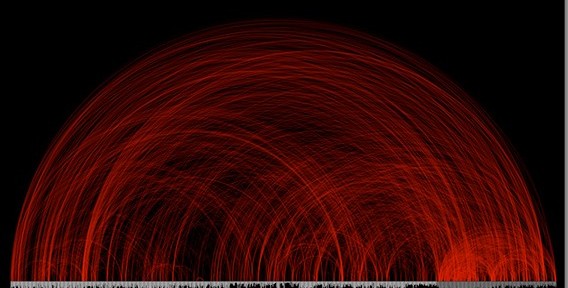Christians who have argued with atheists in online forums have probably seen at least one link to the Skeptic’s Annotated Bible (SAB) or its refined version at Project Reason. It lists the objections that Bible critics have compiled over the years into categories like “contradiction,” “science and history,” “absurdities,” and so on. One designer even visualized the alleged contradictions in a poster similar to a popular one which shows biblical cross references.

Several apologists’ responses have cropped up over time, but none are as complete and well-organized as Berend de Boer’s work. In August 2011, Mr. De Boer completed a seven-year project to respond to every objection in the SAB. Perhaps more importantly, he does so in a way that contrasts the scoffer’s flippancy with a kind, temperate, Christian attitude. Consider the challenge and response to Genesis 2:2 about the seventh day of creation:
Skeptic:
Even God gets tired sometimes.
de Boer:
Tired is not the right word, but God himself tells us he was refreshed by his rest, see Ex. 31:17. That is the purpose of the Sabbath for us as well, see Ex. 23:12.
His work draws a great deal from others who have come before. The primary commentary he mentions is John Gill’s Exposition written in 1746, but also referenced an earlier work from 1621 by Johannes Polyander which goes deeper. On the web, lookinguntojesus.net provided a similarly thorough (though poorly organized) reference as well.
Berend describes his motivation in part was to make these answers more accessible in our internet age:
Some skeptics appear to have grown up in new churches with no link to the past, no confessions, no well-known figures from the past, and they seem to invent the wheel every time. That might account for the fact that, according to them, no one was able to give them any answer to the questions they had. Even though these answers were available for 2,000 years… [to find answers] you have to know to search for “John Gill’s exposition”, so that’s still a barrier, but responses to skeptics like mine will make that less of an issue.
When I asked about his overall thought process, he had this to say:
My goal was to find the answers in readily available, very well-known commentaries, and preferably over centuries old. this way no one could accuse me of using “latest greatest research” or things no one could have known. All these skeptics think they come up with something new after 2,000 years, which on the face of it is already preposterous. But I wanted to demonstrate that as well.
The next time you see an angry skeptic on the internet and feel compelled to respond as commanded in 1 Peter 3:15 with meekness and fear. And, if you’re having trouble finding that “ready answer,” a great place to start is with Berend de Boer’s excellent resource.


One reply on “Refuting the Skeptic’s Annotated Bible”
FYI, the link to Project Reason does not work. It was taken down sometime after I and others showed that the alleged contradictions weren’t (and how can one work contradict, when there is nothing given to contradict with?), plus we showed that the beautiful graphic was copied from a Christian.